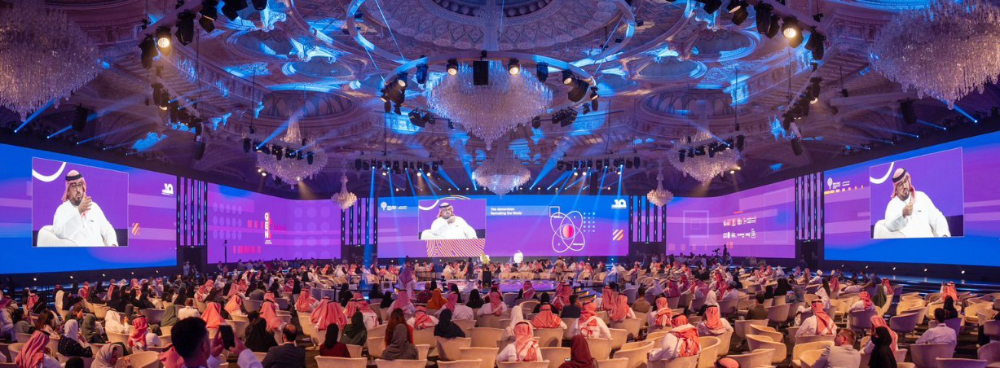RIYADH: Saudi minister of economy and planning, Faisal bin Fadel Al-Ibrahim, discussed the importance of investing in the Saudi youth in an exclusive interview with Arab News.
The minister said young people are “the guardians of tomorrow’s economy” and the key to driving the Kingdom’s economic transformation under Vision 2030.
“We have a responsibility to ensure that young people are equipped with the tools and knowledge to deliver value and impact at the tables of decision-making,” Al-Ibrahim said.
With the youth making up the majority of the Kingdom’s population, the minister highlighted some of the ways he believes Vision 2030 is opening new opportunities for younger generations.
“Vision 2030 was designed to lay the foundations for growth, bringing the Kingdom together on a journey towards a common, prosperous future,” he said.
With their digital-native skills, they can take our economy in exciting new directions, as we continue to accelerate the Kingdom’s diversification, boost the growth of our non- oil sector, and aim to become a top 15 global economy by 2030.
Faisal bin Fadel Al-Ibrahim, Saudi minister of economy and planning
“The new sectors being created by Vision 2030 provide an unprecedented opportunity for Saudi’s youth to drive the new economy. With their digital-native skills, they can take our economy in exciting new directions, as we continue to accelerate the Kingdom’s diversification, boost the growth of our non-oil sector, and aim to become a top 15 global economy by 2030,” he added.
Al-Ibrahim said that the work the Ministry of Economy and Planning is currently doing contributes to the realization of Vision 2030.
He stressed the ministry’s commitment to helping develop future economists, researchers, and policy planners is continuous, and will carry this work forward into the Kingdom’s future.
“I’m constantly amazed by what our youth can do when they are given the opportunity,” he said.
“Empowering young people to work on, and ultimately invest in themselves, will only serve to strengthen our future labor market, boost productivity and enhance our global economic competitiveness,” he added.
Al-Ibrahim was a speaker on day two of the Misk Global Forum that concluded on Thursday in a session titled “The Generation Remaking the World,” where he discussed the ways of empowering the youth and the Kingdom’s future leaders with the skills to navigate economic transformation inclusively and collaboratively.
“The energy and dynamism that is radiating from our young people today — which was on full display at the Misk Global Forum 2022 — is inspiring. They are our future and the guardians of tomorrow’s economy. And we must invest in them now to unlock the potential of the demographic dividend we have, with one of the world’s largest youth populations,” he said.
The minister discussed the importance of holding open discussions and gatherings to tackle global issues from all perspectives from the youth to older generations, such as the Misk Global Forum.
“There is tremendous value in opening your mind to young energy. Bringing different generational perspectives to any challenge only enhances the solutions we are able to design and execute,” he explained.
“As a nation, we are designing policies that work for all, in a forum that is open to people from across the generational spectrum to contribute to. This sends a very clear message to our youth that there is nothing stopping them from contributing meaningfully to the country’s economic transformation,” he added.
The minister also highlighted his ministry’s role in the Kingdom’s ambitions for sustainability under the UN’s Sustainable Development Cooperation Framework, signed in June this year and running until 2026.
“The Ministry of Economy and Planning recently established the Sustainable Development Steering Committee to oversee performance and coordinate efforts toward achieving the 17 Sustainable Development Goals,” he said.
“It’s led by government experts from the Kingdom who are committed to ensuring the successful implementation of the national SDG agenda,” he added.
“To further enhance our thrust towards SDG realization, we signed the UN Sustainable Development Cooperation Framework in June to accelerate joint efforts to deliver progress on climate and sustainability.”
The framework is one of the main tools to map out cooperation between the UN and the government of Saudi Arabia in sustainability. Some of the 17 goals the Kingdom is working with the UN to achieve include gender equality, education, affordable and clean energy, climate action, and sustainable cities and communities.
The framework is a joint effort between the Ministry of Economy and Planning, the Ministry of Foreign Affairs, and the UN.
The minister concluded the interview with advice to the younger generations in their roles in contributing to the Kingdom’s Vision 2030.
“Developing a problem-solving mindset is crucial in today’s socioeconomic climate. And we’ve already seen clear evidence that they have it,” he said.
“Everyone rallied behind the cause (during the COVID-19 pandemic) and responded to the moment because of this sense of ownership that came with being involved in it. The young people of Saudi Arabia showed themselves to be up for the challenge,” he said.
“They are faced with several major challenges today, and they will have to develop resilience and agility to overcome them.”




























